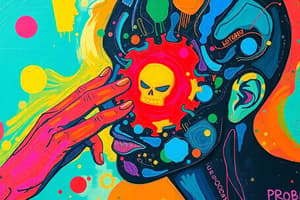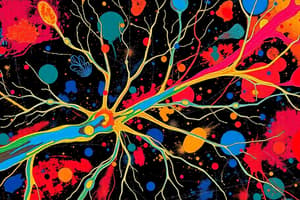Podcast
Questions and Answers
What are some factors influencing psychogenic pain?
What are some factors influencing psychogenic pain?
- Traumatic experiences and group therapy
- Cultural beliefs and negative emotions (correct)
- Stress and physical therapy
- Genetics and previous injuries
Which type of pain may be attributed to beliefs, memories, or emotions?
Which type of pain may be attributed to beliefs, memories, or emotions?
- Biological pain
- Psychogenic pain (correct)
- Environmental pain
- Social pain
What is a characteristic of the sick role according to Talcott Parsons' theory?
What is a characteristic of the sick role according to Talcott Parsons' theory?
- A sick person cannot function in society or receive support
- A sick person can function normally in society and receive support
- A sick person cannot function in society as usual but can receive support (correct)
- A sick person can function normally in society but cannot receive support
What influences how people feel pain in the present day?
What influences how people feel pain in the present day?
What are some psychological symptoms associated with chronic pain?
What are some psychological symptoms associated with chronic pain?
Flashcards are hidden until you start studying
Study Notes
Factors Influencing Pain and Psychogenic Pain
- Biological factors influencing pain include age, genetics, medical conditions, and medications.
- Social factors such as social support, cultural beliefs, location of injury, and daily activities can affect pain perception.
- Psychological factors like stress, mood, expectations, beliefs, and coping mechanisms play a significant role in pain experience.
- Psychological symptoms in chronic pain can include anxiety, depression, guilt, insomnia, and fatigue.
- Psychogenic pain disorder can be attributed to beliefs, memories, or emotions, leading to initiation or worsening of pain.
- Types of psychogenic pain can manifest as headache, stomachache, backache, or muscle pain.
- Causes of psychogenic pain can be linked to the environment, mental health, genetics, and past traumatic experiences.
- The environment associated with pain can contribute to heightened pain levels.
- Negative emotions and pain are associated with the same brain part, influencing pain perception.
- Genetics and previous injuries can influence how individuals feel pain in the present day.
- Past traumatic experiences can lead to a more active nervous system, increasing susceptibility to pain.
- Treatment for psychogenic pain can involve medical doctors, therapists, mental health professionals, behavioral therapy, group therapy, physical therapy, counseling, antidepressants, and non-narcotic painkillers.
Studying That Suits You
Use AI to generate personalized quizzes and flashcards to suit your learning preferences.




